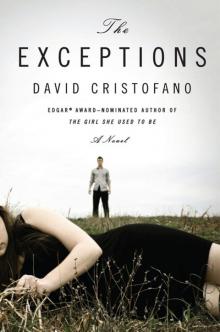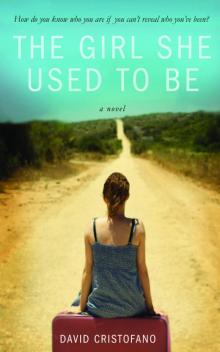- Home
- David Cristofano
The Girl She Used to Be Page 23
The Girl She Used to Be Read online
Page 23
“Rita!” the cook screams.
She rolls her eyes and waves him off.
Now my legs are shaking too.
“Anyway,” she continues, “he kills her, slices her into pieces, and dumps her into the East River or the Hudson or both.”
I swallow and almost choke on my saliva. I try to act casual. “How’d they find this out?”
“He turned himself in. Even brought her bloodied sundress with him.”
I wipe the tears before they run down my face. “Allergies,” I say.
“She was his first murder—supposedly—and he couldn’t handle the guilt, or some crap like that. But if he hasn’t lost his mind already, he will soon.”
“Huh?”
“I mean literally.”
“I don’t follow.”
“He’s hooked up with the Justice Department and he’s giving them every shred of knowledge he has on his family’s operation. He’s taking them all down.”
An older gentleman seated three stools away from me keeps his eyes locked on his newspaper and adds, “He doesn’t stand a chance. He’ll be dead in a week.”
“Good,” Rita says, “an eye for an eye, Carl.”
“The guy’s a hero, if you ask me,” Carl says. “He flipped on the bad guys. One less group of thugs in New York.”
“He’s a loser.”
“He’s a hero.”
“He’s a loser.”
I look up and let the tears roll down my face and whisper, “He’s a hero.”
Carl and Rita stop their arguing.
Rita leans forward again, hands me a napkin. “What’s wrong, honey? Why are you crying?”
I smile a little and say, “It’s a very sad story.”
She cocks her head and studies me, but says nothing.
“They ever find her body?” I ask.
Carl says, “They gave it a shot but the tides have been rough. Her body parts are probably in Lower New York Bay by now. They’re never gonna find her.”
I want to call Sean. I want to hold his face tightly. I want him to hear me when I say, “You see, Sean? Jonathan Bovaro was indeed my hero after all. You know nothing.”
Jonathan gave me something the Justice Department and the U.S. Marshals and the Bovaro family could never deliver: He gave me my life back.
I reach in my bag and pull out a twenty and drop it on the counter and prepare to leave.
Rita smiles. “You, uh, new to the area? Just wondering if we’ll see you again.”
I shrug. “Yeah, I’m new to the area. I might be back.”
She takes the twenty from the counter and asks, “What’s your name?”
I walk to the door and stare at the empty street. Just before I leave, I turn and smile and say, “I haven’t decided yet.”
I EVENTUALLY BECAME FELICIA EMERSON, NOT BECAUSE I HAD some longing for Scottish roots, but because the San Diego State University student I blackmailed outside his favorite college hangout had the name available on his template of fake IDs. At first I convinced him I was a federal agent and that he’d been nabbed helping a few freshmen gain entrance to the bar. Later, I gently extorted a host of documents out of him: driver’s license, birth certificate, even a Social Security card that he reissued to me by way of a dead teenager in Alabama, all through the miracles of computers—and their vulnerability of being hacked—and high-quality printers. The kid was amazing. He even had the California seals to make the documents official.
He would have served some serious jail time.
But his real concern was how he would—or would not—be able to get into law school with a felony on his record.
He created my documents gratis and I disappeared from his life.
I moved to Los Angeles a month later, in July, where I tested into UCLA’s adult education program and managed to shave off two years of school—and almost every undergraduate math course they offer.
I am now a twenty-seven-year-old college junior.
Felicia Emerson has a host of student loans, a small one-bedroom apartment near the campus, a stack of textbooks, a laptop computer, and a deep-seated, though not entirely understood, hatred for USC.
I feel at home here: the carefree nature of the students, the slow pace of academia, the gorgeous and consistent weather. I plan on staying in college until I finish my Ph.D. and, God willing, become a professor. Every day, as my unshackled existence unfolds, I get a greater understanding of the woman I am becoming—and oddly, of the girl I used to be. Without facing some certain future, my past could have no bearing.
It has been nearly five months since Jonathan returned my life to me, and every night I fall asleep thinking of him—though, rest assured, I fall asleep—and sleep well. I watched him in the news every day for months and saved every image I could find of him on the Internet. He was and is brave, still standing against his family and, most miraculously, still living.
You see, he entered WITSEC.
I think of him fondly each day, imagining him cooking someone’s eggs at a greasy spoon in the Midwest or delivering mail in northern Wisconsin or managing a warehouse in Tennessee.
And though I will never see him again, these truths tell part of his story: The marshals protect him but they hate him; Jonathan rarely sleeps because he never knows when someone will find him; he will accidentally expose his true identity or someone will recognize him and he will be moved on to another place, another city, another state; he will be miserable every single day.
He can’t say he wasn’t warned.
And I hope he’ll think of me the way I think of him. Men, and even some of these frat boys, have tried to meet me, to understand me, to (at a minimum) lust after me. I let them down easy, hand them some excuse that builds their sense of self because the truth would be difficult to grasp: that I am in love and no other body or mind or soul could disconnect the fetter linking me to Jonathan. Any other pair of lips would become his, any hand on my skin would become his, any word would be converted to his style and intonation. And, in the darkest, most sensual moment of the night, I would raise my mouth to the stranger’s ears and whisper softly, “Jonathan, I love you. Only you can make me feel this way.”
Perhaps I did fall in love with Jonathan because he set me free. But I believe we all fall in love for some esoteric and simple reason: the first time a man comes to your rescue, the way he holds you when you kiss, his smile that haunts you and has you endlessly daydreaming. I’m not sure the reason you fall is as important as the fact that you have indeed fallen. At least that’s what I tell myself when I fantasize about a life I will never have with a man I will never fully know.
Oddly, it is Sean who is on my mind at this moment, as I scan the hundred wedding bands in the glass case below me.
“That one,” I say to the jeweler.
He adjusts the felt ring case, removes a thin gold wedding band encased with tiny diamonds and swirls etched into the edges.
“That was handcrafted by one of our artists here.”
I smile. “How much is it?”
“Two thousand, fifty.”
I slide it over my knuckle and it’s snug. I hold out my hand and analyze the ring in the light. It is brilliant and full of life. It’s perfect.
“I’ll take it.”
The jeweler stares at me for a moment. “You understand it’s a woman’s wedding band?”
I do not look at him. “Of course.”
“It’s just very unusual for a lady to buy one for herself.”
I open my checkbook. “I’m not buying it. At least not with my money.” I can’t think of a better way to spend what remains of that nine grand.
He takes my check, studies it. “May I ask why you want a wedding band if you’re not married?”
I look at the jeweler and think of Sean and smile a little. “Well, no matter what, there will only ever be one Mr. Emerson. My heart is his, will always be his, and I’m going to wear this ring to remember him and… partly to send the message to other men
that I’m not available.” I hated Sean when he uttered those words, but now I fully understand them. “That sounds sort of arrogant, doesn’t it?”
The jeweler grins and shakes his head. “It sounds real. I don’t get that much anymore.”
I leave the store and walk out into the cool afternoon and start the long journey back to campus, where I have a class in American Justice; I am the teacher’s pet.
As I walk along the city streets, I watch the blasts of light shimmering from my ring and I twist it around my finger and I think of Jonathan. The clear and distinct memories are fading a bit, the exact words we said, the specific images. He is becoming larger in my mind but shifting more out of focus.
Every day I want to find him, to hunt him down the way he hunted me year after year as I grew older. But we could not and will not ever find each other. He will never know my name and I will never know his. I can’t even send him a cryptic message the way the marshals used to contact distant relatives for witnesses. Our lives are separated, broken at the center and drifting aimlessly, a certain impossibility of reconnection.
Every day I want Jonathan to know that he is inside me, that he is my first, that he will be my only.
My hope, my prayer, is that he will know this truth:
He gave me my freedom; I give him my faith and fidelity.
Forever.
About the Author
David Cristofano’s short fiction has been published by Like Water Burning and McSweeney’s. He currently works in the Washington, D.C., area, where he lives with his wife, son, and daughter.

 The Exceptions
The Exceptions The Girl She Used to Be
The Girl She Used to Be